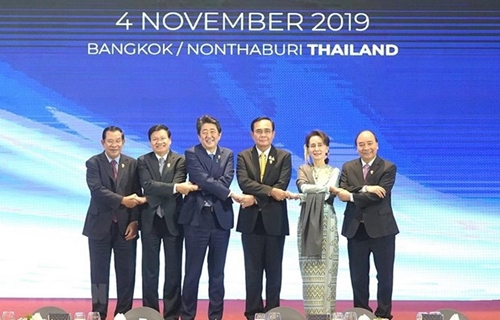The leaders highly valued cooperation between the Mekong region and Japan, saying after 11 years, the relationship has prospered with hundreds of joint projects contributing to the development and prosperity of both sides.
Mekong countries spoke highly of Japan’s support in promoting regional connectivity through the “Partnership for quality infrastructure” and “A decade towards the green Mekong” initiatives.
    |
 |
|
Prime Minister Nguyen Xuan Phuc (right) and other leaders at the 11th Mekong-Japan summit in Bangkok on November 4 |
The participating countries committed to stepping up the implementation of the Tokyo Strategy 2018 in tandem with the realisation of the sustainable development goals (SDGs) in Indo-Pacific, and the Ayeyawady-Chao Phraya-Mekong Economic Cooperation Strategy (ACMECS) Master Plan.
The leaders agreed to enhance connectivity and stressed the significance of economic development in combination with environmental protection, easing the consequences of natural disasters, increasing adaptability to climate change, and sustainably using and managing the Mekong River.
They also agreed to boost cooperation with the Mekong River Commission to realise the goal of a green Mekong and the “Mekong-Japan Initiative for SDGs towards 2030”, and utilise the Fourth Industrial Revolution in socio-economic development in the Mekong region.
The leaders lauded the Japan-US Mekong Power Partnership (JUMPP) initiative that supports sustainable energy development in the Mekong.
Regarding economic cooperation, they underlined the urgent need for digital connectivity between Mekong economies and Japan, and highly valued the ratification of the Mekong Industrial Development Vision (MIDV) 2.0.
Addressing the summit, PM Phuc applauded Japan’s assistance to Mekong countries and said the relationship has significantly contributed to peace, stability and prosperity in the Mekong and Southeast Asia.
He also proposed development orientations for the Mekong-Japan collaboration, saying the two sides should optimise capital sourced from the private sector, increase resources for the green Mekong target, improve infrastructure quality in Mekong countries, and develop high-quality human resources.
The PM used the occasion to reiterate the consistent stance of Vietnam and ASEAN on the East Sea issue, and highlighted the significance of the sea in the region.
He called on countries to respect international law and the 1982 United Nations Convention on the Law of the Sea (1982 UNCLOS), practice self-restraint and engage in dialogue for security, safety and freedom of navigation and aviation, thus building the East Sea into an area of peace, stability and prosperity.
At the end of the summit, the leaders adopted the joint statement of the 11th Mekong-Japan Summit and the Mekong-Japan Initiative for SDGs towards 2030.
Source: VNA